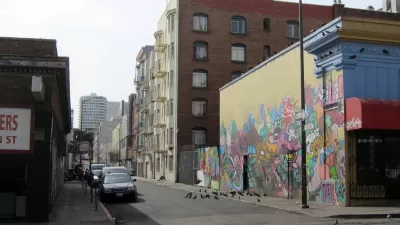Rick Jacobus argues that those who block new development on social justice grounds aren't fighting to win long-term. Building is necessary, but with it should come robust affordable housing mandates.

Rick Jacobus thinks vigorous development can eventually solve the housing crisis, but only if it comes with hefty affordable housing provisions. The first step is for all parties to agree that we should, in fact, be building more housing.
Until recently, Jacobus writes, the term "NIMBY" applied to "middle-class or upper-class residents who resisted the location of affordable housing developments in their neighborhoods. What we are seeing now are movements of the poor and their advocates resisting the location of luxury-housing projects."
While activism can counter displacement in some neighborhoods, the effort to preserve places in amber may be doomed to fail. "We are in the middle of a once in a lifetime tectonic shift in consumer preferences regarding urban living." The well-off want to return to cities, and the new question has become: where to house the rich?
Jacobus rejects the notion that unmitigated free market development will let luxury housing "trickle down," preserving diversity. Instead, he envisions a strong combination of rent control and, even better, social housing in which public or nonprofit landlords keep rents low. These tactics should expand to protect one-third of new development, letting low-income residents share in an urban resurgence.
FULL STORY: Why We Must Build

Planetizen Federal Action Tracker
A weekly monitor of how Trump’s orders and actions are impacting planners and planning in America.

Restaurant Patios Were a Pandemic Win — Why Were They so Hard to Keep?
Social distancing requirements and changes in travel patterns prompted cities to pilot new uses for street and sidewalk space. Then it got complicated.

Map: Where Senate Republicans Want to Sell Your Public Lands
For public land advocates, the Senate Republicans’ proposal to sell millions of acres of public land in the West is “the biggest fight of their careers.”

Maui's Vacation Rental Debate Turns Ugly
Verbal attacks, misinformation campaigns and fistfights plague a high-stakes debate to convert thousands of vacation rentals into long-term housing.

San Francisco Suspends Traffic Calming Amidst Record Deaths
Citing “a challenging fiscal landscape,” the city will cease the program on the heels of 42 traffic deaths, including 24 pedestrians.

California Homeless Arrests, Citations Spike After Ruling
An investigation reveals that anti-homeless actions increased up to 500% after Grants Pass v. Johnson — even in cities claiming no policy change.
Urban Design for Planners 1: Software Tools
This six-course series explores essential urban design concepts using open source software and equips planners with the tools they need to participate fully in the urban design process.
Planning for Universal Design
Learn the tools for implementing Universal Design in planning regulations.
Heyer Gruel & Associates PA
JM Goldson LLC
Custer County Colorado
City of Camden Redevelopment Agency
City of Astoria
Transportation Research & Education Center (TREC) at Portland State University
Camden Redevelopment Agency
City of Claremont
Municipality of Princeton (NJ)





























